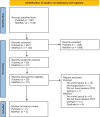A Systematic Review of the Protective Effect of Prior SARS-CoV-2 Infection on Repeat Infection
- PMID: 34592838
- PMCID: PMC8564250
- DOI: 10.1177/01632787211047932
A Systematic Review of the Protective Effect of Prior SARS-CoV-2 Infection on Repeat Infection
Abstract
We systematically reviewed studies to estimate the risk of SARS-CoV-2 reinfection among those previously infected with SARS-CoV-2. For this systematic review, we searched scientific publications on PubMed and MedRxiv, a pre-print server, through August 18, 2021. Eligible studies were retrieved on August 18, 2021. The following search term was used on PubMed: ((("Cohort Studies"[Majr]) AND ("COVID-19"[Mesh] OR "SARS-CoV-2"[Mesh])) OR "Reinfection"[Majr]) OR "Reinfection"[Mesh]. The following search term was used on MedRxiv: "Cohort Studies" AND "COVID-19" OR "SARS-CoV-2" AND "Reinfection". The search terms were broad to encompass all applicable studies. There were no restrictions on the date of publication. Studies that did not describe cohorts with estimates of the risk of SARS-CoV-2 reinfection among those with previous infection were excluded. Studies that included vaccinated participants were either excluded or limited to sub-groups of non-vaccinated individuals. To identify relevant studies with appropriate control groups, we developed the following criteria for studies to be included in the systematic analysis: (1) baseline polymerase chain reaction (PCR) testing, (2) a uninfected comparison group, (3) longitudinal follow-up, (4) a cohort of human participants, i.e. not a case report or case series, and (5) outcome determined by PCR. The review was conducted following PRISMA guidelines. We assessed for selection, information, and analysis bias, per PRISMA guidelines. We identified 1,392 reports. Of those, 10 studies were eligible for our systematic review. The weighted average risk reduction against reinfection was 90.4% with a standard deviation of 7.7% (p-value: <0.01). Protection against SARS-CoV-2 reinfection was observed for up to 10 months. Studies had potential information, selection, and analysis biases. The protective effect of prior SARS-CoV-2 infection on re-infection is high and similar to the protective effect of vaccination. More research is needed to characterize the duration of protection and the impact of different SARS-CoV-2 variants.
Keywords: COVID; COVID-19; SARS-CoV-2; immunity; natural immunity; prior infection; reinfection; vaccination; vaccine.
Conflict of interest statement
Figures
References
-
- Abu-Raddad L. J., Chemaitelly H., Coyle P., Malek J. A., Ahmed A. A., Mohamoud Y. A., Younuskunju S., Ayoub H. H., Al Kanaani Z., Al Kuwari E., Butt A. A., Jeremijenko A., Kaleeckal A. H., Latif A. N., Shaik R. M., Abdul Rahim H. F., Nasrallah G. K., Yassine H. M., Al Kuwari M. G.…Bertollini R. (2021). SARS-CoV-2 antibody-positivity protects against reinfection for at least seven months with 95% efficacy. EClinicalMedicine, 35, 100861. 10.1016/j.eclinm.2021.100861 - DOI - PMC - PubMed
-
- Addetia A., Crawford K. H. D., Dingens A., Zhu H., Roychoudhury P., Huang M. L., Jerome K. R., Bloom J. D., Greninger A. L. (2020). Neutralizing antibodies correlate with protection from SARS-CoV-2 in humans during a fishery vessel outbreak with a high attack rate. Journal of Clinical Microbiology, 58(11). 10.1128/JCM.02107-20 - DOI - PMC - PubMed
-
- Breathnach A. S., Duncan C. J. A., Bouzidi K. E., Hanrath A. T., Payne B. A. I., Randell P. A., Habibi M. S., Riley P. A., Planche T. D., Busby J. S., Sudhanva M., Pallett S. J. C., Kelleher W. P. (2021). Prior COVID-19 protects against reinfection, even in the absence of detectable antibodies. Journal of Infection, 83(2), 237–279. 10.1016/j.jinf.2021.05.024 - DOI - PubMed
-
- Christie A., Brooks J. T., Hicks L. A., Sauber-Schatz E. K., Yoder J. S., Honein M. A., Team C. C.-R. (2021). Guidance for implementing COVID-19 prevention strategies in the context of varying community transmission levels and vaccination coverage. Morbidity and Mortality Weekly Report (MMWR), 70(30), 1044–1047. 10.15585/mmwr.mm7030e2 - DOI - PMC - PubMed
Publication types
MeSH terms
LinkOut - more resources
Full Text Sources
Medical
Miscellaneous


